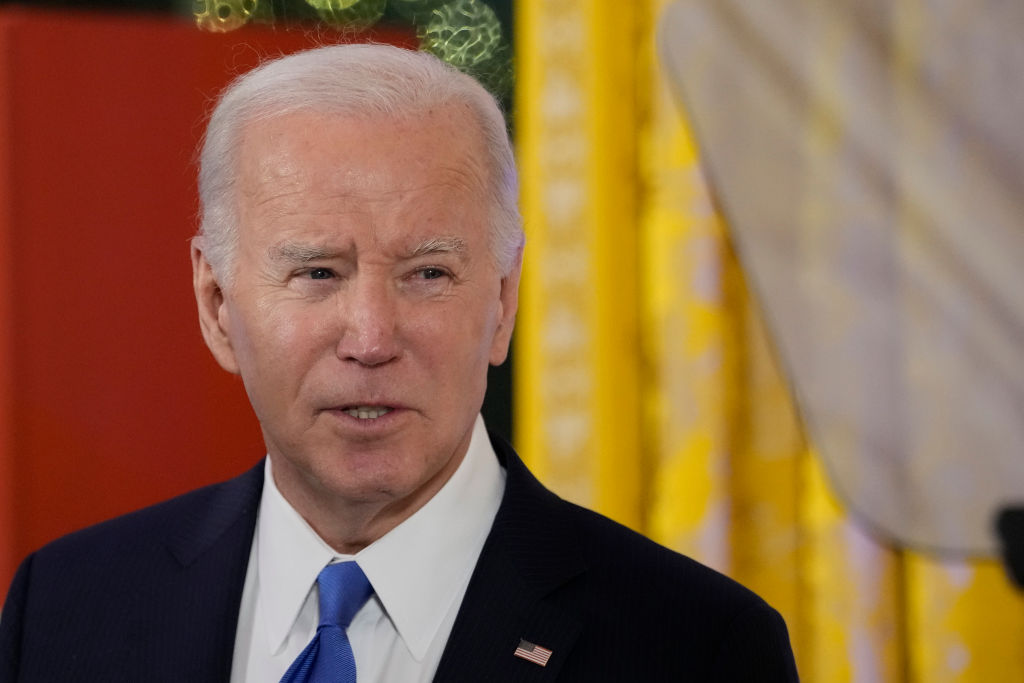In recent weeks, Iran has waged a shadow war against the United States and its interests in the Middle East. The Biden administration has responded cautiously, hoping to avoid an escalation of the conflict. But this logic is misguided: To restore deterrence, the United States should hit Iran hard.
Iran was, of course, behind Hamas’ October 7 attack on Israel, as it has trained and equipped the terrorist organization for many years. Following the attack, Iran ramped up its provocations against U.S. forces, bases, and interests in the Middle East. Iranian-backed Hezbollah has launched rockets into northern Israel. Iranian-backed Shiite militias have conducted more than 100 attacks against U.S. forces and bases in Iraq and Syria. These attacks have resulted in serious injuries, including putting one U.S. servicemember in critical condition. Iran has also ramped up its production of enriched uranium, shrinking its dash time to a nuclear bomb.
Perhaps most egregious, however, has been the Houthi attacks on commercial shipping in the Red Sea. Iran provides the Houthis with weapons and training; it’s Iranian drones and missiles that the Houthis are firing on one of the most important shipping lanes in the world, with around 15 percent of global shipping transiting the Suez Canal, the most direct route between Europe and Asia. Maintaining freedom of navigation on the high seas has been a vital U.S. interest for decades, but these attacks have already significantly disrupted commercial shipping and global trade. An increasing number of shipping companies have sought longer alternative routes, including sailing around the Cape of Good Hope. According to one report, the companies that have altered shipping routes “control around half of the global container shipping market.” The cost of insurance for ships transiting the Red Sea is also rising. Taken together, Iran’s aggression has caused shipping delays, disrupted supply chains, and higher costs to deliver goods.
Shockingly, the Biden administration has barely responded to these provocations. The United States has played defense, putting together an international Red Sea Task Force to escort commercial ships, employing air and missile defenses to shoot down incoming drone and missile strikes, and sinking Houthi boats in self-defense from an attempted hijacking. The United States has also engaged in a small number of pinprick attacks directly against Iranian-backed proxy groups in Iraq and Syria.
The Biden administration has reportedly stepped cautiously because it fears “escalation.” The worry is that U.S. and/or Israeli reprisals will only prompt Iranian counterattacks that could spiral into a region-wide war at a time when the United States already has its hands full with major wars in Europe and Gaza, and a growing Chinese threat. This excessive fear of escalation has been a hallmark of Biden’s foreign policy. Fearing Russian escalation in Ukraine, Biden repeatedly held back on providing Ukraine with the military capabilities it needed, including tanks, aircraft, air and missile defense, HIMARS artillery, and ATACMS missiles. He later changed his mind, but this slow-yes strategy has needlessly hampered Ukraine’s battlefield effectiveness. Worrying that the tough bipartisan approach with China established over the past several years risked veering from competition to conflict, the Biden administration spent much of 2023 kowtowing to Beijing, sending a string of high-level officials to China and rolling out the red carpet for Xi in San Francisco in November.
Hoping that U.S. caution will be reciprocated by dangerous adversaries is a coherent line of thought, but it is often counterproductive as a strategy. If Iran can continue to conduct attacks against U.S. interests with impunity, then it will continue to do so. We have seen that American caution has not led to de-escalation. Rather, American weakness has encouraged more aggression.
If America’s foremost priority is to avoid escalation, then it essentially hands the initiative to its more ruthless adversaries—those who are willing to escalate militarily in order to achieve their goals.
American strategy documents for many years have vowed to deter Iranian aggression. But deterrence has now failed. So the operative question now becomes: How can the United States restore deterrence?
Deterrence works by convincing an adversary that the costs to attacking the United States and its allies and interests greatly outweighs any conceivable benefits.
When deterrence fails, therefore, the United States needs to execute its deterrent threat. It needs to follow through and impose a significant cost on Iran that outweighs the perceived benefits of aggression—as Tehran calculates it. It needs to convince Tehran that it badly miscalculated and that attacking the United States and its interests is too costly. In other words, it is escalation, not de-escalation, that is necessary to restore deterrence with Iran.
This means the United States should hit Iran hard. It could retaliate directly against the Houthis’ military infrastructure. It could roll up Iranian proxy networks in the region. It could sink the Iranian navy. It could strike Iranian naval bases, or even seize this opportunity to degrade Iran’s nuclear and missile program. These are all steps the president can take on his own initiative consistent with the 1973 War Powers Act. U.S. actions of this magnitude would convey to Iran that it miscalculated and that attacking the United States was a foolish decision that should not be repeated.
Limited U.S. uses of force against Iran have proven effective in the past. In 1988, Ronald Reagan authorized Operation Praying Mantis in response to Iran’s mining of the Persian Gulf during the Iran-Iraq War. The United States destroyed about half of Iran’s navy, and the prospect of a larger conflict with the United States helped to persuade Tehran to accept a ceasefire.
Similarly, exactly four years ago to the day, January 3, 2020, President Donald J. Trump authorized a drone strike that killed Iranian general Qassem Suleimani, prompting only token Iranian retaliation and demonstrating that Iran would suffer significant consequences for attacking U.S. interests in the region.
Decisive military action against Iran now will also strike fear into the hearts of Putin and Xi. Biden is currently showing Putin and Xi that the United States does not have the stomach for a conflict, potentially tempting China and Russia to engage in aggression. A strong stand against Iran will not distract from other American geostrategic priorities, but rather will strengthen deterrence in Europe and the Indo-Pacific.
The Biden administration is correct that there is a risk of escalation in this course of action. But if Iran retaliates, then America can simply hit Iran harder. The United States enjoys “escalation dominance,” meaning that at every rung of the military escalation ladder Iran stands to lose more. Only when this is made clear to Tehran, will it restrain its desire to retaliate.
The United States is still a military superpower. It should act like it. Iran—not the United States—should be cowering in fear of escalation.






Please note that we at The Dispatch hold ourselves, our work, and our commenters to a higher standard than other places on the internet. We welcome comments that foster genuine debate or discussion—including comments critical of us or our work—but responses that include ad hominem attacks on fellow Dispatch members or are intended to stoke fear and anger may be moderated.
With your membership, you only have the ability to comment on The Morning Dispatch articles. Consider upgrading to join the conversation everywhere.